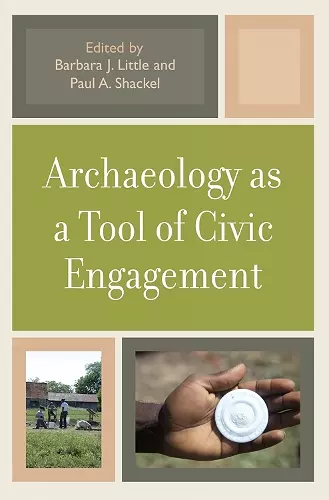Archaeology as a Tool of Civic Engagement
Promoting Ethical Practices in Archaeology and Community Life
Barbara J Little editor Paul A Shackel editor
Format:Hardback
Publisher:AltaMira Press
Published:17th May '07
Currently unavailable, and unfortunately no date known when it will be back
This hardback is available in another edition too:
- Paperback£43.00(9780759110601)

This book challenges archaeologists to engage with communities ethically, advocating for social justice and civic responsibility in their work. Archaeology as a Tool of Civic Engagement offers valuable insights.
In Archaeology as a Tool of Civic Engagement, authors Little and Shackel present a compelling argument for the integration of archaeology with civic responsibility and social justice. Through a series of case studies from diverse regions such as the United States, Guatemala, Vietnam, Canada, and Eastern Europe, they illustrate how archaeological practices can go beyond mere cultural resource management. The authors emphasize the importance of engaging with local communities, advocating for ethical practices that prioritize the voices and needs of those affected by archaeological work.
The book serves as an essential resource for archaeologists and community planners alike, offering practical models for civic engagement. Little and Shackel stress the significance of participatory approaches that involve community members in the decision-making processes related to preservation and planning. By fostering dialogue and collaboration, they argue that archaeology can contribute to a more equitable and just society.
Archaeology as a Tool of Civic Engagement is not just an academic text; it is a call to action for professionals in the field. The authors’ commitment to social justice and civic responsibility is evident throughout the book, making it a valuable guide for historians, museum professionals, and anyone interested in the intersection of archaeology and community engagement. Their insights encourage a rethinking of the role of archaeology in modern society, highlighting the potential for positive change through ethical practices.
There is a new kind of public archaeology emerging; one that takes seriously archaeology’s potential to understand the past to give a sense of meaning for our future. This work has the familiar goals of inventorying significant sites and doing better archaeology. It also aims to build better communities. Archaeology as a Tool of Civic Engagement provides us with lessons, sometimes painful and sometimes exhilarating, from some of our most accomplished colleagues, whose research has explored the ways in which we tell the truth about the past and thereby is a source of hope for the future. -- Robert Paynter, University of Massachusetts
If archaeology is to become relevant to society at large, the papers in Archaeology as a Tool of Civic Engagement can show us the way....The contributors to Archaeology as a Tool of Civic Engagement clearly demonstrate that in living up to our social obligations archaeology can be a powerful tool in redressing long-standing problems of social justice. * Canadian Journal of Archaeology *
Archaeology as a Tool of Civic Engagement provides a useful and interesting set of case studies. Furthermore, its central thesis that the inclusion of descendant and other affected communities into the practice of archaeology can be empowering and potentially lead to a greater interest in heritage is a worthy topic for discussion. * American Anthropologist, Fall 2009 *
The archaeologists in this volume have stepped up to the plate to present a rich selection of essays on how archaeology can be used to promote social justice. As the authors note, public engagement with the past makes archaeology more socially relevant and democratizes knowledge. Little and Shackel are to be commended for their vision of archaeology's future. -- Barbara J. Mills, University of Arizona
ISBN: 9780759110595
Dimensions: 235mm x 160mm x 23mm
Weight: 581g
294 pages